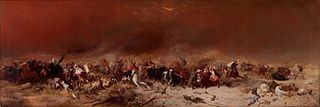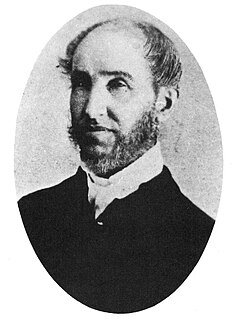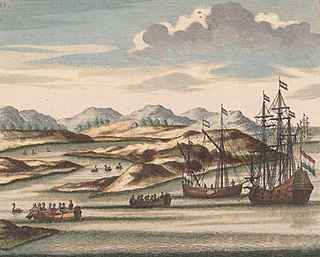Related Research Articles

Western Australia is a state occupying the western 32.9 percent of the land area of Australia excluding external territories. It is bounded by the Indian Ocean to the north and west, and the Southern Ocean to the south, the Northern Territory to the north-east, and South Australia to the south-east. Western Australia is Australia's largest state, with a total land area of 2,527,013 square kilometres (975,685 sq mi), and the second-largest country subdivision in the world, surpassed only by Russia's Sakha Republic. As of 2017, the state has about 2.6 million inhabitants – around 11 percent of the national total – of whom the vast majority live in the south-west corner; 79 percent of the population lives in the Perth area, leaving the remainder of the state sparsely populated.

Albany is a port city in the Great Southern region in the Australian state of Western Australia, 418 kilometres (260 mi) southeast of Perth, the state capital. The city centre is at the northern edge of Princess Royal Harbour, which is a part of King George Sound. The central business district is bounded by Mount Clarence to the east and Mount Melville to the west. The city is in the local government area of the City of Albany. It is the oldest colonial settlement in Western Australia, predating Perth and Fremantle by over two years.

The human history of Western Australia commenced between 40,000 and 60,000 years ago with the arrival of Indigenous Australians on the northwest coast. The first inhabitants expanded across the east and south of the continent.
The Swan River Colony, also known as the Swan River Settlement, or just Swan River, was a British colony established in 1829 on the Swan River, in Western Australia. This initial settlement place on the Swan River was soon named Perth, and it became the capital city of Western Australia.

Guildford is a suburb of Perth, Western Australia, 12 km northeast of the city centre within the City of Swan. Guildford was founded in 1829 as one of the earliest settlements of the Swan River Colony. It is one of only three towns in the metropolitan area listed on the Register of the National Trust.

Lieutenant Robert Dale was the first European explorer to cross the Darling Range in Western Australia.
The following lists events that happened during 1829 in Australia.

William Mitchell was a Church of England priest who was the second ordained person, after The Rev Louis Giustiniani to provide religious services in the Swan Valley area of the Swan River Colony. He worked in the Swan Parish for over 20 years before moving to Perth to take up a position working with convicts and prisoners in the Perth Gaol in Beaufort Street.

The Pinjarra massacre, also known as the Battle of Pinjarra, occurred on 28 October 1834 at Pinjarra, Western Australia when a group of Binjareb Noongar people were viciously attacked by a detachment of 25 colonial soldiers, police and settlers led by Governor James Stirling. According to Stirling, "about 60 or 70" of the Binjareb people were present at the camp and John Roe, who also participated, estimated about 70–80. This roughly agrees with an estimate of 70 by an unidentified eyewitness.

Whaling was one of the first viable industries established in the Swan River Colony following the 1829 arrival of British settlers to Western Australia. The industry had numerous ups and downs until the last whaling station closed in Albany in 1978.
Dr Alexander Collie was a Scottish surgeon and botanist who journeyed to Western Australia in 1829, where he was an explorer and Colonial Surgeon.

Western Australia Day or simply WA Day is a public holiday in Western Australia, celebrated on the first Monday in June each year to commemorate the founding of the Swan River Colony in 1829. Because of the date of Western Australia Day, WA does not have the Queen's Official Birthday public holiday in June, as do the other Australian states; it is held in September or October instead.
This is a timeline of Aboriginal history of Western Australia.
This is a list of members of the Western Australian Legislative Council from October 1870 to June 1872. The chamber had 18 members, as specified by the Legislative Council Act 1870. Section 1 of this Act specified that a minimum of one-third of the Council would be appointed by the Crown. Three of these were official nominees who were part of the Continuous Ministry—namely the Colonial Secretary, Attorney-General and the Surveyor-General—while the remaining three were "non-official nominees".

McKail is a north-western suburb of Albany in southern Western Australia. Its local government area is the City of Albany. The suburb has a median age of 33. McKail was named after John MacKail who in 1835 wrongly killed Whadjuk Noongar Goggalee and was forced to leave the Swan River settlement.
Henry Willey Reveley (1788-1875) was a civil engineer responsible for the earliest public works at the Swan River Colony, the foundation of the state of Western Australia.
Rivett Henry Bland was an early settler and a government administrator in colonial Australia.

William Grills Knight was a prominent businessman and politician who served as the Mayor of Albany in the Great Southern region of Western Australia.

Anne Camfield was a photographer, pioneer teacher and headmistress in Western Australia. She founded the first school for Indigenous children in Western Australia, called Annesfield.
Arthur Trimmer (1805–1877) was one of three brothers who were early settlers in the colony of Western Australia. He was the grandson of Sarah Trimmer (1741–1810), an educational reformer and writer. Arthur’s father was William Kirby Trimmer who married Jane Bayne in 1794, with whom he had seven children. He owned a successful brickmaking business and collected fossils. He suffered a stroke in 1810 and died four months later, when Arthur was only five.
References
- 1 2 3 4 "A PIONEER: JOHN MCKAIL'S ASSOCIATION WITH ALBANY", Albany Advertiser, 10 December 1930.
- 1 2 3 "EARLY ALBANY", Albany Advertiser, 27 April 1929.
- 1 2 3 4 John McKail – Biographical Register of Members of the Parliament of Western Australia. Retrieved 28 December 2016.
- ↑ Ann Hunter (2006). "A different kind of 'subject': Aboriginal legal status and colonial law in Western Australia, 1829–1861". PhD thesis, Murdoch University. pp. 49, 158.
- ↑ "ALBANY ELECTION.", The Perth Gazette and Western Australian Times, 28 October 1870.
- ↑ The Inquirer and Commercial News, 12 April 1871.